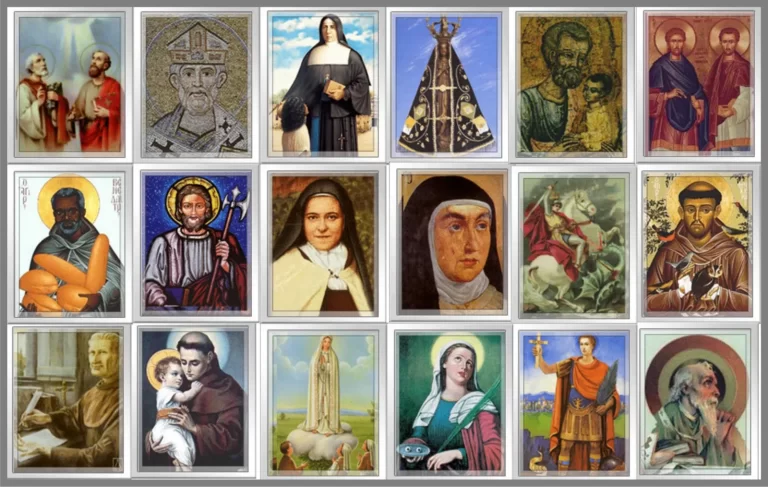Learn about the Holy Catholic Act of Contrition
Have you felt the desire to express your repentance? The Act of Contrition is the prayer itself to express repentance in the face of our offenses against God. To repair such injuries we have to go to the Sacrament of Confession, through which the act of contrition is achieved for due repentance and the promise not to sin again. By following this reading you will find out much more.
act of contrition
When an act of contrition is made, it is not due to a feeling of affliction, shame or uneasiness. It is a determination of intelligence and free consent, not sensitivity. It is the posture of that sinful person, who in this way assumes his repentance, pain, sorrow for the fault committed by having offended God.
The anguish for sins is due to the repentance of having insulted God for being He who He is, and not only for the prizes that were not obtained or for the deserved punishments. Repentance is the most important thing in the act of contrition , since through it the fault is repudiated and life is redirected to God. The person must be fully repentant to pray the act of contrition.
Main Features
An act of contrition is an act of a religious nature, particularly of the Catholic religion. It happens when a person incurs a sin and has repented. The act of contrition is esteemed as a sacrament: the sacrament of penance. When performing the act of contrition, the person renounces to consummate similar acts that offend the Lord.
The person must recognize the serious mistake he made with his actions and must firmly promise not to sin again. Whoever performs an act of contrition must in no way be coerced into doing so. The doctrine contemplates that if repentance does not originate from one’s own initiative, it will truly have no value or meaning in the face of divine judgment.
Elements of Repentance
Regret consists of three components: feeling or regret, repudiation or renunciation, and intention to change. All of them have been and are essential elements to legitimize repentance, so that with only one of them the legitimacy of this moral resolution would be doubted.
The first is the sorrow caused by the fact of recognizing oneself as a sinner, of having insulted God. In second position is the renunciation of sin, the frank feeling of leaving the fault behind. The third component is the intention to change, the firm resolution not to sin again. If you are not sincerely sorry, you should ask the Holy Spirit for the gift of repentance. This is achieved through the prayer of the Chaplet of Divine Mercy.
The Main Types of Acts of Contrition
Not only are there acts of contrition for offenses against God, they are also known among others: the act of contrition for first communion , the full catholic act of contrition , the ancient catholic act of contrition , the short act of contrition for children , etc. Below are the best-known acts of contrition in which, in addition to acknowledging repentance, the purpose of amending each of them is made clear:
Simple Act of Contrition
The Catholic Act of Contrition consisting of three words: “My Lord, forgive me”, “My Lord, forgive me”, is particularly, according to the Church, for those who are at risk of death, since the meaning of listening is the last to be lost at the time of death and is also used for the Sacrament of Penance (Confession).
To obtain an Act of Contrition, no formula is required, but it is necessary to have the just conscience to retract the sins committed. Among the acts of one who sins, Contrition is in the first position. It is “a torment of the soul and an abhorrence of the fault committed with the determination not to sin again.” (Catechism of the Catholic Church, 1451)
Act of Contrition at Mass
During the Eucharist, following the greeting to the Congregation by the priest, the Penitential Act is carried out, in which the officiant invites the crowd to admit their own sins, accompanied by the prayer that begs God for forgiveness (act of contrition). . The Congregation observes a moment of silence, so that those present repent of their faults, aware of them.
The act of contrition is addressed to the Almighty God, since sin truncates the dialogue with Him; to the brothers, since according to the theology of the Church, sin harms the holiness of the Church, for which we are fully responsible. For such an act, the Roman Missal provides three different modes of Penitential Act:
The first is the “I confess”, the most common, which has a double facet of repentance and conversion; by insulting God, he is appeased with him; if he has come to offend the Church, he also calls for appeasement with the Church, for which the saints and the Church gathered in Assembly are asked to pray for sins consummated with the following prayer:
“Jesus, my God and Redeemer, I have repented of all the sins that I have committed until today, and it pains me with all my heart since with them I insult such a benevolent God. I firmly declare not to sin again and I trust that by your infinite commiseration you will grant me absolution of my sins and you will lead me to eternal life. Amen”
The second way is a conversation that unites the hope that God manifests his compassion and grants his redemption. The third way, are litanies that alternate with supplications or the song of “Lord, Have Mercy”. The missal shows a diverse series of petitions for the third mode, giving the officiant the possibility of choosing according to the liturgical season. In addition to these three ways, the Missal suggests the Rite of blessing and sprinkling of water, especially in the Sunday Eucharist.
Extrasacramental Contrition
Extra-sacramental perfect contrition is only allowed at the risk of the sinner’s death and is authorized only if one has the sublime desire to obtain the Sacrament of Reconciliation (Confession). The Council of Trent agreed that “reconciliation should not be imputed to contrition itself, without the objective included in it of obtaining the Sacrament.” The act of repentance or contrition must be salutary, interior, superhuman, universal, and highest in its estimation.
Attrition
«It is not usual that men, particularly those not cultivated in spirit, can easily access a perfect contrition, counting as the only reference to God himself. The tradition of the Church teaches that sentiments of rejection of sin for other less theocentric and more anthropocentric reasons are equally magnanimous: fear of punishment, failure to reach Heaven, repentance, shame, etc». Pedro Chico Gonzalez
Attrition are not finished feelings, but competent to guide the spirit against evil. Attrition is fearful of punishment, thus being a selfish feeling. This is a fear that brings us closer to repentance and leads us to conversion, which the Church considers as a resource to achieve sacramental reconciliation.
The Council of Trent stipulated that “attrition is not sufficient, without the sacrament of penance, to excuse the sinner, but that he can arrange to obtain the grace of justification through the sacrament.” (Denz. 898)
According to theology, it is the act of repentance without having the purpose of amending the behavior, in such a way that being Imperfect Contrition, it generates perfect Contrition. Attrition estimates sin as an injury to God and not a fault, it estimates the ugliness of sin itself, as well as the fear of hell and punishment (Denzinger 898).
Division of Contrition
Theology separates contrition according to its quality into perfect (“contritio caritate”) and imperfect (“contritio late dicta”), which is also called attrition.
“When it is born of the love of God adored above all things, contrition is called “perfect contrition” (contrition of charity). Such contrition absolves venial faults; It also achieves the forgiveness of mortal sins if it includes the firm determination to go to sacramental confession as soon as possible. The contrition called “imperfect” (or “attrition”) is also a divine gift, an impulse of the Holy Spirit.
“It emerges from the appreciation of the ugliness of sin or from the fear of eternal damnation and of the other penalties with which the sinner is threatened. Such disturbance of conscience can be the beginning of an internal evolution that ends, under the action of grace, in sacramental forgiveness. However, by itself imperfect contrition does not achieve forgiveness of serious faults, but determines to obtain it in the sacrament of Penance. (Catechism of the Catholic Church, 1452, 1453)
Perfect contrition absolves venial and mortal faults. His motivation is found in the love of God, in a posture of sadness produced in superior abilities, talent and will, in the face of the injury done to God, the Supreme Being.
Trento council
According to the Council of Trent in Chapter IV, it is stated that the act of contrition is like “a deep pain and abhorrence of the consummated sin, with the intention of not sinning again… at all times this movement of contraction has been required, to achieve absolution from sins.
According to Martin Luther, the contrition that was inspired by the fear of the punishment of hell made the Christian a hypocrite, a penitent. The most relevant contritionists were Alejandro de Hales (1186-1245), Miguel Bayo (1513-1570) and later the Jansenist authors.
Contrition in Current Theology
According to theology and the Church, contrition is the first and most important act of repentance. The act of contrition is considered a return to the Father as the giving Son, with the result that “this contrition of the heart is subordinated to the truth of penance” (Reconciliatio et Paenitentia, 31).
Theology analyzes the act of contrition in two ways, that of the repudiation of sin and the redirection of one’s own existence to God, including adherence to the redemption granted by Christ and verified by the Church.
Prayers for the Act of Contrition
Although they are not contained in the prayer of the common Rosary, any of these prayers about the act of contrition can be included in your prayer of the Rosary. They are in themselves prayers of repentance for the faults and sins committed, in which forgiveness is implored and it is promised not to commit sins again. There are numerous different prayers, with the same meaning, the important thing is that you feel the prayer and offer it to God with sincerity.
Short Act of Contrition
My Lord, it pains me to have insulted you knowing I am so benevolent, forgive me, I do not wish to offend you again.
repentance prayer
My Lord, Jesus Christ, God and authentic man, Creator, Father, my Savior,
because you are who you are, perpetual benevolence, and because I adore you above all things,
it hurts me with all my heart to have insulted you, it also hurts me because you can mortify myself with
the afflictions of hell.
Moved by your divine grace, I firmly
propose never to sin again, confess and complete the penance with which I was punished,
for the absolution of my sins. Amen.
I Sinner Prayer and Act of Contrition
My Lord, I am sorry with all my heart for all the evil that I have caused and the good that I have failed to do; since sinning I have insulted you, who are the Supreme good and worthy of being adored above all things. I firmly propose, with your favor, to consummate penance, not to sin again and avoid opportunities for sin. Grant me forgiveness, Lord, for the virtues of the Passion of our Redeemer Jesus Christ. Amen.







